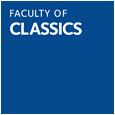Statement on Racism
The Classics Faculty shares with other parts of the University of Oxford a profound revulsion at the killing of George Floyd. We are well aware that this is not an isolated episode, but part of a pattern of racially-motivated violence which has cost many innocent lives, and that it is itself a symptom of systematic disadvantages, inequalities, and prejudices across many contemporary societies and cultures. The time has come when - with all institutions of higher education - we must make our antipathy to racism more audible and effective, and devise and implement much more robust procedures of self-scrutiny and reform to combat this evil. There is a great deal to be done to overcome complacency and to respond to the zeal for change which is evident around us today.
It is in this spirit of new beginnings that we make the following preliminary statement about how the imperatives which arise from contemporary challenges to racism relate to the basic purposes and practices of the Faculty. Our aim as a Faculty is to research and teach the worlds of - and around - the ancient Greeks and Romans. Our subject’s core is a period of about a millennium and a half, which came to an end about the same length of time ago. Its horizons reach up the Nile and across the Sahara, along the shores of the Indian Ocean, and right across west Asia. Those places and periods were always violent; unfreedom, exploitation, and aggression were everywhere. These comprehensively permeated all ancient thought, utterance and behaviour. Slavery and war constantly counterpointed the pursuit of co-operation, altruism, or shared wellbeing. The contestations and paradoxes within such worlds are an essential part of our subject. Another is the formation of institutional, political, religious, social, and emotional communities, their interaction, and the effects all this has had on the multiple worlds which have engaged with those around Greece and Rome. The first Greek poetry belongs in a tradition also seen in the epics of south Asia. The art and architecture of ancient cities shared themes with Egypt. Islam and Christianity and the early societies which practiced them worked in dialogue with legacies of Greece and Rome, in Byzantium or medieval western Europe. Another part of our aim is understanding how all these developments out of what we call Classics changed and morphed in new conditions. Cultures which had knowledge of Greece and Rome continued the wars and exploitations, the enslavements and the atrocities, as well as parts of the religion, the philosophy, and the institutions, and embedded ancient tradition in their own ideologies. Among those cultures, those of western Europe, in which the institutions of our own University historically developed, undoubtedly made often pernicious use of their own understanding of the Classical past.
We take this opportunity to state unequivocally that our research into the Greeks and Romans and their reception no more endorses ideas of imperial supremacy or racial superiority which have been used by peoples of the last millennium than it condones the conditions of the slave-run silver-mines of Athens or the ways in which the Romans sacked cities. Our goal is rather to explore, analyse, and represent these ancient continua as usefully and faithfully as we can, and in a spirit as just and egalitarian as we can achieve, to contribute - within our society - to the humane comprehension of cultural complexity, social diversity, and resilience in the face of danger and oppression.
These aspirations will, we hope, encourage constructive discussions among academics and students in all parts of the Faculty and across the University. We also hope to involve a wider public in exploring in today's contexts the nature of our subjects and the principles of our scholarship.



